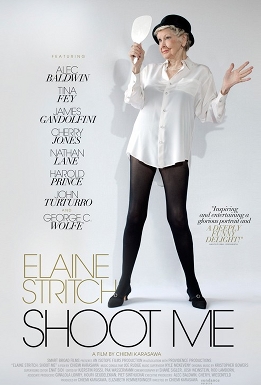Good news, humans: the woman who plays Jack Donaghey’s mother on 30 Rock is actually just as hilariously bitchy in real life as she is on that show.
For musical theater types and the culturally literate, elderly Elaine Stritch will be a dear, familiar legend. If you fall into that camp, go ahead and mock the rest of us ignorant millenials who only know her as Jack Donaghey’s mother on 30 Rock.
The gospel is that Ms. Stritch is just as hilariously bitchy in real life as she is on that show, she has an incredible voice—the proof of which is available in a large back catalogue of Broadway scores—and she is still alive and very much kicking.
All of this good news is brought to you by Chiemi Karasawa’s new biography, Elaine Stritch: Shoot Me. Karasawa’s bootlace budget forced her to make a great creative decision: focusing on time spent following her subject rather than the tired format of showing copyrighted clips and punctuating them with interviews. This makes Shoot Me more like a concert movie than a traditional bio-doc. It uses her recent tour (that’s right, the 87-year old is still working), Singing Sondheim: One Song at a Time, as a framing device in addition to talking about her impressive history—awhich includes working with Sondheim and dating JFK.
The greatest compliment I can give this movie is that it captures some of the magic of Elaine Stritch. The ultimate example of the sassy matriarch, she’s like an American new money version of Maggie Smith or Dame Judi Dench. Irrepressible, irreverent, irresistible. She’s in her 80s, and I’d be floored to have her at a dinner party. She is the personification of that kind of women some us were privileged to have in our communities growing up: the kind of older woman who can read you like a crime scene, who you immediately feel knows more about you than you’ve allowed you to know. These human bullshit detectors are like burning bushes or the 10 Commandments in Indiana Jones—watch out.
Elaine weaves swear words into her conversation like some kind of crass monk making a Zen garden, and it’s a delight to watch. Eighty minutes of just her talking to a set up camera on a tripod probably wouldn’t bore, and she should probably let go of Sondheim and focus on film and the standup circuit, she’d be brilliant.
But Karasawa resists the temptation to give too much of the snarky Elaine and shows the soft side that even the prickliest have—it shows her struggles with alcoholism, her fear of impending mortality and the realization that all things fade away into dust.
I don’t normally have a large appetite for documentaries, but this is one I’ll be recommending to anyone who will listen.

